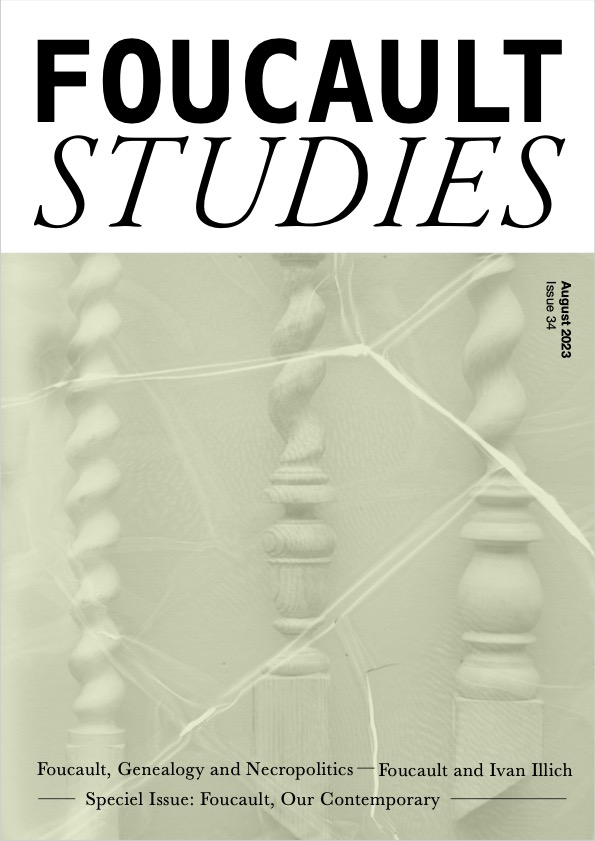Genealogies of Nothing: Enforced Disappearances, Fable Lives, and Archives in Erasure
DOI:
https://doi.org/10.22439/fs.i34.6938Keywords:
Necropolitics, Enforced Diasappearance, Archives, Critical Fabulation, ResistanceAbstract
This article investigates the political impact of collective story-telling practices in the enforced disappearances from a Foucauldian perspective. I utilize two main theoretical frameworks: on the one hand, that of necropolitics, a kind of power that works on the management of death. On the other hand, that of genealogy as a type of history that mobilizes subjugated knowledges. The first part situates these stories within the framework of genealogy: subjugated knowledges that are buried and disqualified as a part of the work of necropolitics. The second part argues that a Foucauldian genealogical approach to these stories is insufficient: necropolitical archives, when they testify to the work of power, remain incomplete at best and actively erase more often. The third part analyzes these stories as examples of critical fabulation. What is at stake in the insistence of the people searchers to tell their stories, I argue, is the collective emergence of another kind of fable – an act of fabulation in line with what Saidiya Hartman calls “critical fabulation,” which multiplies the possibilities of the present and the past by precisely telling stories of ‘nothing.’
References
Alpkaya, Gökçen, “Kayiplar Sorunu ve Turkiye,” Ankara Universitesi SBF Dergisi, 50:3 (1995), 31-63. https://doi.org/10.1501/SBFder_0000001842.
Angelo, Paul, “Colombia: False Reports, Failed Justice”, Latin American Bureau, https://lab.org.uk/colombia-false-positives-failed-justice/ (accessed May 17, 2023).
Bargu, Banu, “Sovereignty as Erasure: Rethinking Enforced Disappearances” Qui Parle: Critical Humanities and Social Sciences 23:1 (2014), 35-75. https://doi.org/10.5250/quiparle.23.1.0035.
Bellucci, Mabel, “Childless Motherhood: Interview with Nora Cortinas, a Mother of the Pla-za de Mayo, Argentina,” Reproductive Health Matters 7:3 (1999), 83-88. https://doi.org/10.1016/S0968-8080(99)90116-7
Bozkurt, Hatice and Özlem Kaya, Holding Up the Photograph: Experiences of the Women Whose Husbands Were Forcibly Disappeared. Istanbul: Hakikat Adalet Hafıza Merkezi, 2014.
Colombia Reports Data, “Extra Judicial Executions,” https://colombiareports.com/false-positives/ (accessed May 17, 2023).
Deutscher, Penelope, Foucault’s Futures: A Critique of Reproductive Reason. New York: Co-lumbia University Press, 2017.
Erlenbusch-Anderson, Verena, Genealogies of Terrorism: Revolution, State Violence, Empire. New York: Columbia University Press, 2018.
Foucault, Michel, “Historical A Priori and the Archive” [1969] in Archeology of Knowledge, trans. Alan Sheridan. Pantheon: New York, 1972.
Foucault, Michel, “Lives of Infamous Men” [1977], in Power, ed. James Faubion, trans. Robert Hurley and others, 157-175. New York: The New Press, 1994.
Foucault, Michel, Society Must be Defended, Lectures at Collège de France 1975-1976, trans. David Macey, ed. Mauro Bentani and Alessandro Fontana. New York: Picador, 1997.
Foucault, Michel, “The Subject and Power,” Critical Inquiry 8:4 (1984), 777-795.
Foucault, Michel, Speech Begins after Death, In conversation with Claude Bonnefoy, [1968], ed. Philippe Artières, trans. Robert Bononno. Minneapolis and London: University of Minne-sota Press, 2011.
Gordon, Avery, Ghostly Matters: Haunting and the Sociological Imagination. Minneapolis and London: University of Minnesota Press, 1997.
Göral, Özgür Sevgi, Ayhan Işık, and Özlem Kaya, Unspoken Truth: Enforced Disappearances. Istanbul: Truth, Justice and Memory Center, 2013.
Hartman, Saidiya, Lose Your Mother: A Journey Along the Atlantic Slave Route. New York: Farrar, Straus and Giroux, 2008.
Hartman, Saidiya, “Venus in Two Acts” in Small Axe 12:2 (2008), 1-14. https://doi.org/10.1215/-12-2-1.
Hartman, Saidiya, Wayward Lives, Beautiful Experiments: Intimate Histories of Social Upheaval. New York and London: W.W. Norton & Co., 2019.
Human Rights Watch, “On Their Watch Evidence of Senior Army Officers’ Responsibility for False Positive Killings in Colombia,” https://www.hrw.org/report/2015/06/24/their-watch/evidence-senior-army-officers-responsibility-false-positive-killings, (accessed May 17, 2023).
Huffer, Lynne, “Foucault’s Fossils: Life Itself and the Return to Nature in Feminist Philos-ophy,” Foucault Studies 20 (2015), 122-141. https://doi.org/10.22439/fs.v0i0.4933
Koopman, Colin, How We Became Our Data: A genealogy of the Informational Person. Chicago: University of Chicago Press, 2019.
Mbembe, Achille, “Necropolitics,” trans. Libby Meintjes, Public Culture 15:1 (2003): 11-40. https://doi.org/10.2307/j.ctv1131298.
Mbembe, Achille, “Provisional Notes on the Postcolony,” Africa: Journal of the International African Institute 62:1 (1992), 3-37. https://doi.org/10.2307/1160062.
Mbembe, Achille, On the Postcolony. Berkeley: University of California Press, 2001.
McWhorter, Ladelle, Racism and Sexual Oppression in Anglo-America: A Genealogy. Blooming-ton and Indiana: Indiana University Press, 2009.
Parkin Daniels, Joe, “Colombian army killed thousands more civilians than thought, study claims,” theguardian.com. https://www.theguardian.com/world/2018/may/08/colombia-false-positives-scandal-casualties-higher-thought-study (accessed May 17, 2023).
Perez Solla, Mária Fernanda, Enforced Disappearances in International Human Rights. Jefferson and London: McFarland &Co. Inc, 2006.
Read, Peter and Marivic Wyndham, Narrow But Endlessly Deep: The Struggle for Memorializa-tion in Chile Since the Transition to Democracy. Sydney: Australian National University Press, 2016.
Taylor, Diana, Disappearing Acts: Spectacles of Gender and Nationalism in Argentina’s Dirty War. Durham and London: Duke University Press, 1997.
Downloads
Published
How to Cite
Issue
Section
License
Copyright (c) 2023 The Author

This work is licensed under a Creative Commons Attribution-NonCommercial-NoDerivatives 4.0 International License.
Authors retain copyright to their work, but assign the right of the first publication to Foucault Studies. The work is subject to a CC BY-NC-ND 4.0 license, but despite these restrictions, authors can take for granted that Foucault Studies will permit articles published in Foucault Studies to be translated or reprinted in another format such as a book providing a full reference is made to Foucault Studies as the original place of publication.



